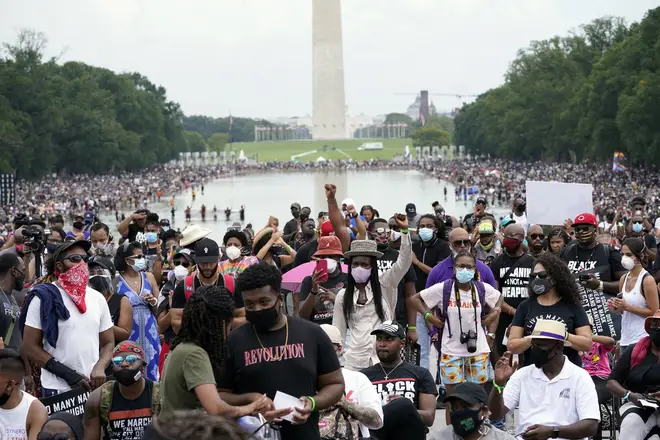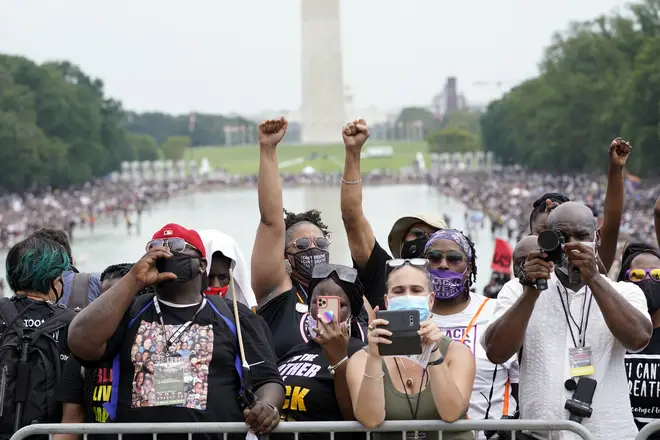
Iain Dale 10am - 1pm
28 August 2020, 21:14

Thousands attend march on Washington
Civil rights advocates in the US have highlighted police and vigilante violence against black Americans at a commemoration of the 1963 March on Washington for Jobs and Freedom.
Thousands of people attended the rally, with dozens speaking passionately about ongoing violence against black citizens in the US and police brutality, most recently highlighted by the shooting of Jacob Blake in Wisconsin.
The shooting of 29-year-old Jacob Blake by a white police officer in Kenosha, Wisconsin, on Sunday sparked days of protests and violence that left two dead.
Mr Blake's father, also named Jacob Blake, attended the march and addressed the crowds, telling those in attendance that his own dad was at the original March on Washington.
"I truly did not want to come see you all here today for these reasons," he said, adding: "But I have a duty."
Thousand stood at the steps of the Lincoln Memorial where Martin Luther King Jr delivered his historic I Have A Dream address about racial equality.

"We've got to create a different consciousness and a different climate in our nation," said Martin Luther King III, a son of the late civil rights hero and co-convener of the march.
"That won't happen though, unless we are mobilised and galvanised," Mr King said.
He and the Reverend Al Sharpton, whose civil rights organisation, the National Action Network, planned Friday's event, said the objective of the march is to show the urgency for federal policing reforms, to decry racial violence, and to demand voting rights protections ahead of the November general election.
To underscore the urgency, Rev Sharpton has assembled the families of an ever-expanding roll call of victims including George Floyd, Breonna Taylor, Rayshard Brooks, Ahmaud Arbery, Trayvon Martin, Eric Garner, Mr Blake and others.
Mr Floyd, Ms Taylor, Mr Brooks and Mr Garner were all killed by US police officers, while Mr Arbery and Mr Martin were both killed by white men who pursued them with guns.
Mr Floyd's sister, Bridgett Floyd, told the crowds: "My brother cannot be a voice today ."
"We have to be that voice, we have to be the change".

Jacob Blake's mother calls for violence to end
"I want to give space for Black people in the crowd to say they are not okay," said Jumaane Williams, New York City's public advocate, who addressed march attendees shortly after the program began.
"We are like the nameless grandmothers who got in the streets and said, 'We will make you live up to what America says she is,'" Williams said. "We are here. We're not going anywhere."
Activist Frank Nitty, who said he walked 750 miles for 24 days from Milwaukee, Wisconsin, to Washington for Friday's march, spoke to the audience about persistence in the fight for justice.
"Are y'all tired? Because I'm tired," Mr Nitty said. "They think this is a negotiation, but I came here to demand change. My grandson ain't gonna march for the same things that my granddaddy marched for. This is a revolution."
March attendee Jerome Butler, 33, of DC, echoed Mr Nitty's sentiment.
"My hope is that my son doesn't have to be out here in another 50 years protesting the same thing," Mr Butler said.

Later on, Rev Sharpton told the crowd during his impassioned speech: "You act like it's no trouble to shoot us in the back. You act like it's no trouble to put a choke-hold on us while we scream 'I can't breathe' 11 times.
"You act like it's no trouble to hold a man down on the ground until you squeeze the life out of him."It's time for a new conversation."
He added: "Some say to me, 'Reverend Al, y'all ought to denounce those that get violent, those that are looting?' All of the families have denounced the looting. What we haven't heard, is you denouncing shooting.
"We will speak against the looting, but when will you speak against wrong police shooting?"
In June, the Democrat-controlled House of Representatives passed the George Floyd Justice In Policing Act, which would ban police use of stranglehold manoeuvres and end qualified immunity for officers, among other reforms. Mr Floyd, a black man, died on May 25 after a white police officer in Minneapolis held a knee to the man's neck for nearly eight minutes, sparking weeks of sustained protests and unrest.